Fellows Journal
Fellows Journal. The Royal Canadian Geographical Society
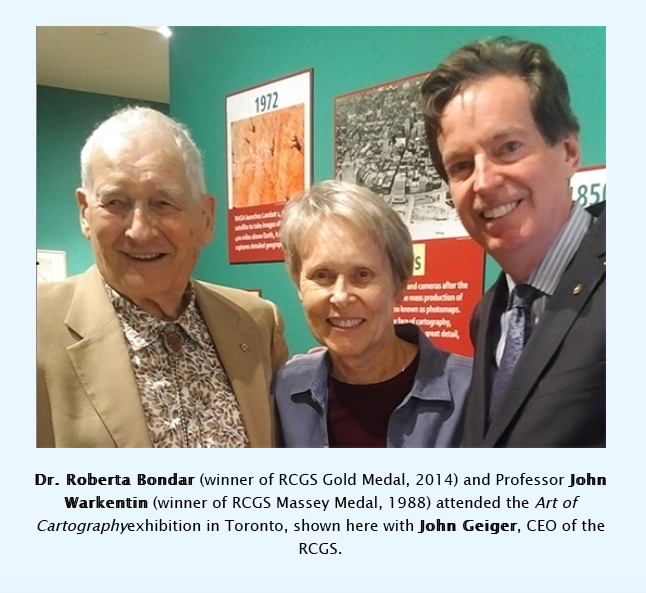
Fellows Journal. The Royal Canadian Geographical Society

Sault Ste Marie ON
Sault Ste Marie, Ontario, November 1, 2016 – The Royal Canadian Mint officially unveilled a silver collector coin celebrating the 25th anniversary of Dr. Roberta Bondar’s Space Shuttle Mission at Sault College before a crowd of local dignitaries and well-wishers.

RELATED MEDIA:
Nov 4, 2016
WEB FEATURE:
from Bob McDonald – CBC News:
Astronaut Roberta Bondar shows us that space and conservation are 2 sides of the same coin Canadian Mint pays tribute to Bondar’s work in space and on Earth
Nov 2, 2016
WEB FEATURE:
from CollectSpace:
Canada’s first woman in space, astronaut Roberta Bondar, honored with coin
Nov 1, 2016
WEB FEATURE:
from The Roberta Bondar Foundation:
Some of The Roberta Bondar Foundation coverage of the launch Photos and other memories
ROYAL CANADIAN MINT FEATURE PAGE:
Detail, description and order information
ROYAL CANADIAN MINT VIDEO FEATURE:
Commemorative #BondarCoin as it rotates and glows!
CTV VIDEO FEATURE:
A Tribute to Canada’s 1st Female Astronaut to Enter Space Well-rounded feature with several and themed responses around Dr. Bondar and the STS-42 story. Captures look of surprise & delight on face of audience.
SAULT WEB FEATURE:
Star Struck. Dr. Roberta Bondar ‘Out of this World’ Silver Coin Revealed Includes candid photos of Bondar with delighted Sault supporters
SOOTODAY WEB FEATURE:
First of its kind coin honours Bondar; astronaut says Sault will always be home. Bondar calls friends, family her ‘stars’
SAULT STAR WEB FEATURE:
Historic space mission a quarter century ago
CBC WEB FEATURE:
25 years after Discovery mission, mint issues Roberta Bondar coin
Toronto ON
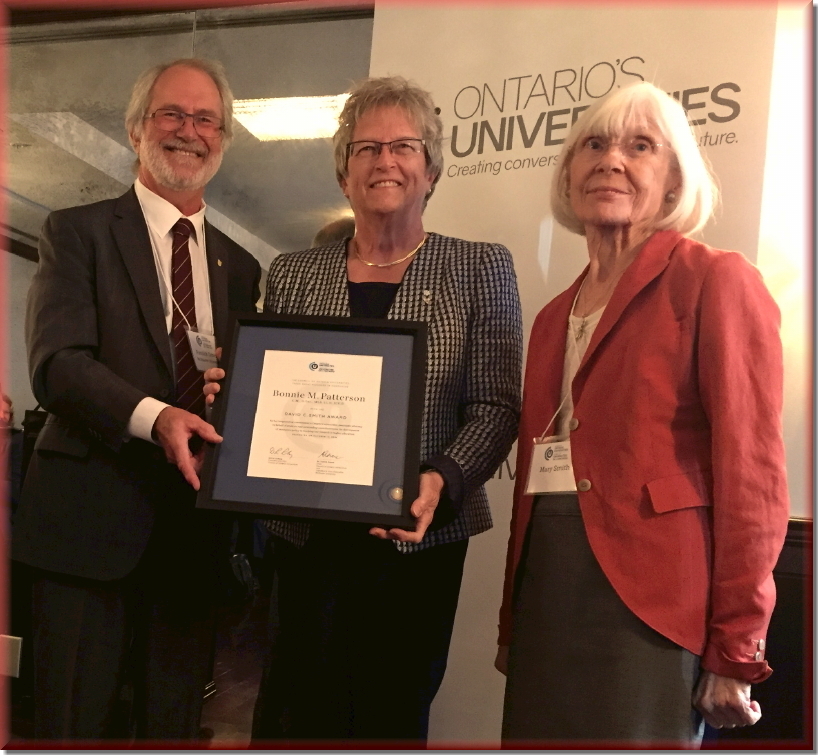
Prof Bonnie M. Patterson C.M. O.Ont MLS LL.D ICD.D was honoured by The Council of Ontario Universities [COU] with its David C Smith Award
for her longstanding commitment to Ontario Universities, passionate advocacy on behalf of students and outstanding contributions to the development of innovative policy in teaching and research in higher education.
For more about this 2016 David C. Smith Award to our trailblazing, trendsetting Board Chair!
Toronto ON
Join us in a celebration of Dr. Roberta Bondar, and The Roberta Bondar Foundation’s work to promote a healthy planet and healthy lives.
#BondarBash #TakingCareOfEarth
The PLACE!
STORYS Building – 11 Duncan Street, Toronto, ON M5H 3G6
The TIME!
Wednesday, 21 September 2016 from 7:00 PM to 10:00 PM (EDT)
In the North American cities we live, it is often difficult at night to tell the few stars we might see from the airplane headlights twinkling at us. The city’s artificial light may dim in the “off hours” of most human activity but the remaining glow also provides a night sky viewing experience that Dr Roberta Bondar judges is akin to looking through a cataract, significantly obscuring our vision of even our own Milky Way.
In a recent segment [June 16, 2016] of The Current with Anna Maria Tremonti, CBC Radio, several aspects of Dark Skies are discussed:
This podcast features:
People can grow up without even knowing what they’re missing — without seeing the natural night skies that they might yet experience in the national parks of the western United States or Canada.
There is growing evidence that suggests that losing the dark sky at night can possibly have a real impact on human health. Artificial light at night impacts both the physical and mental well-being of humans and other animals.
It exacerbates problems when it comes to healing disease or infection since artificial light at night seems to reduce the body’s ability to fight those. The dark sky promotes better sleep during which the body tends to its repairs and rejuvenation.
Light refracted from cloud cover and higher levels within our atmosphere over cities can be seen for a hundred kilometres or more in its surrounding countryside. When even the light of a full moon can curtail the foraging patterns of many animals, this artificial light spillover impacts those animals since that sky glow can exceed that of a full moon.
In terms of simply being aware of ourselves in relation to Nature and the Universe, if we can’t see the information that exists within a natural night sky, we can’t fully relate to Nature. If we lack awareness or understanding of natural dark sky phenomena, we cannot ask insightful questions and seek answers about ourselves and our environment. This lack of free knowledge and natural experience degrades our insight into who we are as a life form in the greater natural universe.
In Canada, RASC is instrumental in setting up guidelines and trying to define what a dark sky preserve should be. Dark Sky preserves give an opportunity for people to be able to participate and look at the night sky unencumbered by the light pollution that interferes with our vision of a natural night. Using its guidelines, The Society assigns official designations to three types of light-restricted protected areas: Dark-Sky Preserves™, Urban Star Parks™ and Nocturnal Preserves™
Dr. Roberta Bondar
“The light glow, the glow that we get because the light hits dust and particles in the atmosphere and scatters it so it basically makes the sky look like a big cataract,” said Dr Bondar. “if you know there’s a canopy overhead that’s like having a big white cataract, you’re not going to be moved [to look up]. I mean, that’s just the bottom line.”
Besides the loss of the Science and the Math, we also lose our ability to wonder and dream and think in terms of science fiction, poetry, music, painting – all the interconnected cultural components that define and feed the life form we are.
Fortunately, Dark Sky Reserves provide access to a brighter, cleaner, clearer view of this incredible wealth of information and wonder.
Some links to Dark Skies resources include:
Beaver Hills Dark-Sky Preserve
Parks Canada link – Beaver Hills Dark-Sky Preserve
Cypress Hills Interprovincial Park Dark-Sky Preserve
Gordon’s Park Dark-Sky Preserve
Dedicated website – Gordon’s Park
Mont-Mégantic Dark-Sky Preserve
Mégantic Dark-Sky Preserve
International Dark Sky Association – [En] Mont-Mégantic International Dark Sky Reserve [MMIDSR]
International Dark Sky Association – [Fr] La Réserve internationale de ciel étoilé du Mont-Mégantic [RICEMM]
Point Pelee National Park Dark-Sky Preserve
Parks Canada link – Point Pelee National Park Dark-Sky Preserve
Orillia ON
Lakehead University, Orillia Campus
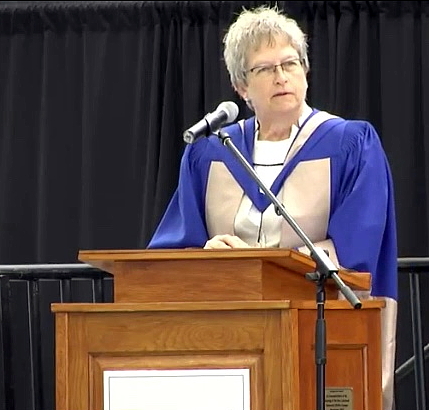
Professor Bonnie M Patterson, C.M.O. Ont. B.A. M.L.S. ICD.D, receives an Honorary Doctor of Commerce at Convocation. She also delivers the Convocation Address — a “Get a GRIPP!” [Gratitude, Relationships, Integrity, Passions, and Patience]”
Patterson, The Roberta Bondar Foundation Board Chair, is recognized as a champion of higher education and a role model for women in leadership. She was the first woman Dean of Business in Canada, the first woman President of the Council of Ontario Universities (COU), the first woman President & Vice-Chancellor of Trent University, and, while President at Trent, she was the first woman to Chair the Board of Universities Canada (then known as the Association of Universities and Colleges of Canada).
Throughout her career, Bonnie has spearheaded several international education initiatives including working with the Association of Commonwealth Universities (ACU) as an International Expert to develop a composite model for benchmarking university sustainability.
WEB FEATURE:
Lakehead University Orillia celebrates its Class of 2016
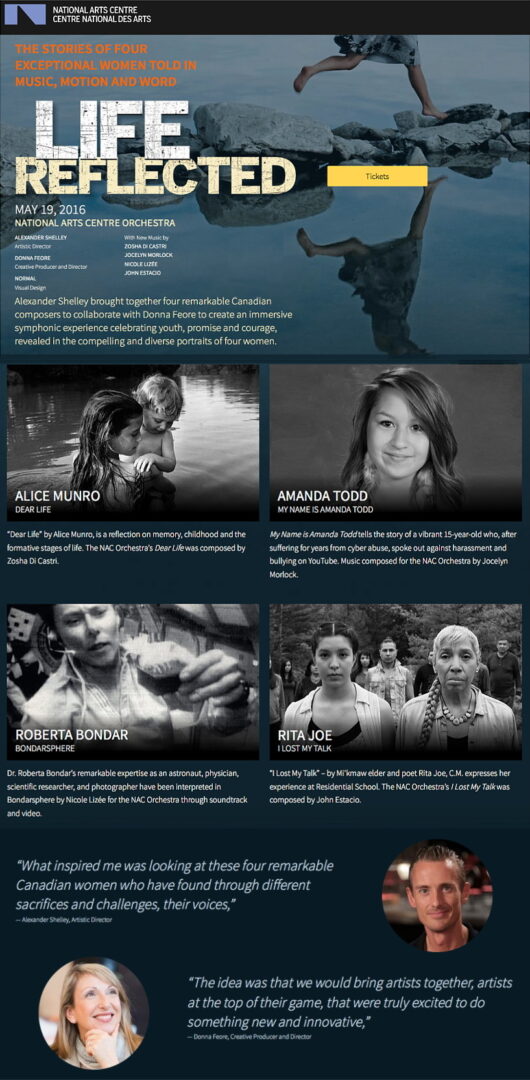
A collection of powerful stories inspired by life experiences of four exceptional Canadian women — Alice Munro, Amanda Todd, Roberta Bondar and Rita Joe.
The stories are told in a sensory immersion of multidisciplinary composition — music, film, dance, photography.
Life Reflected is what we at The Roberta Bondar Foundation call a Fusion Adventure — collaborations that merge the science in Arts + the art in Sciences. You can catch some of our Fusion Adventures here.
WEB FEATURE:
Review: NACO’s Life Reflected shares a universal message of hope
Cambridge ON
Don’t miss The Foundation’s special selection of fine art prints from the TELE + new works + Bondar Challenge youth winners = Landscapes of Biodiversity now playing at the Cambridge Butterfly Conservatory!
A beautiful venue. Unique animal galleries. A remarkable conservatory!
Cambridge Butterfly Conservatory 2500 Kossuth Road
Cambridge, Ontario, N3H 4R7
519-653-1234
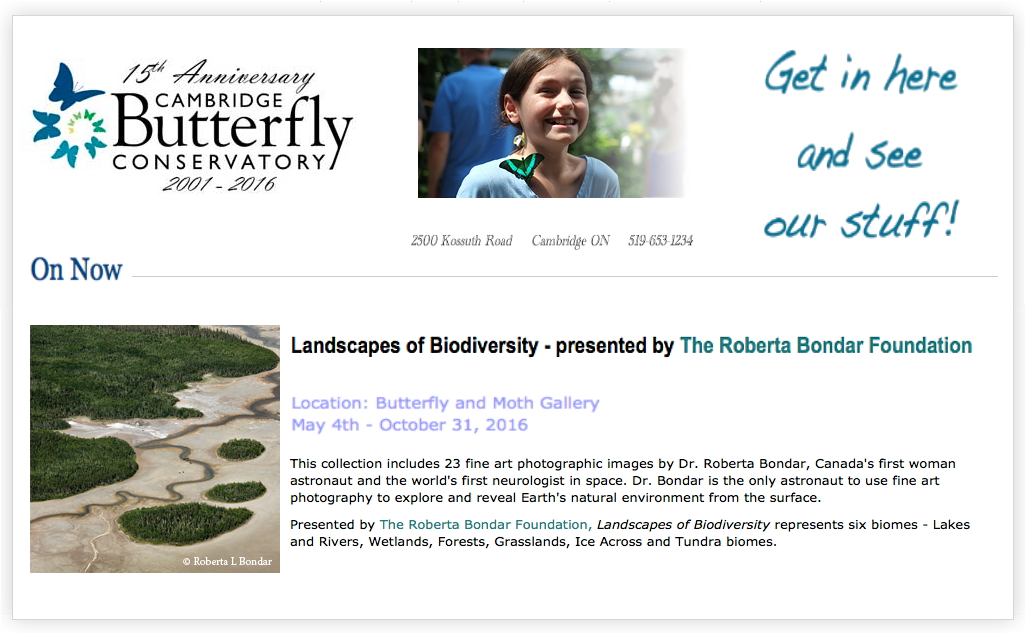
Explore our photo gallery HERE!
Ottawa ON
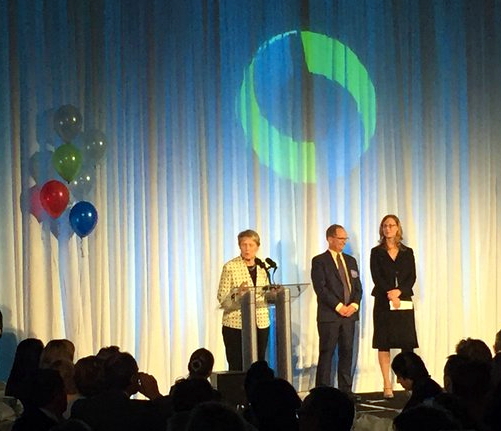
The Dr. Roberta Bondar Career Development Program was announced at the 25th anniversary celebration of the Canadian Women in Communications and Technology [WCT] organization. Ron Parker, President of Shared Services Canada, and Kelly Gillis, Associate Deputy Minister, Innovation Science and Economic Development Canada made the announcement.
Dr. Bondar joined the WCT gathering to help with the formal launch of this new intensive internship program.
The WCT has long committed to sponsoring women as leaders and contributors to Canada’s economy based on science, technology and the digital transformation of all industries and has designed the Dr. Roberta Bondar Career Development Program to help its participants succeed and achieve remarkable things – to truly take their careers Faster Further and Higher.
We are proud our president was chosen as both namesake and symbol of all qualities that WCT hopes to identify and foster through this program – women of wide-ranging curiosity, dedication and tenacity – women who inspire present and future generations to literally shoot for the stars.
WEB FEATURE:
Space pioneer helping young women find career launchpad
Ryerson University
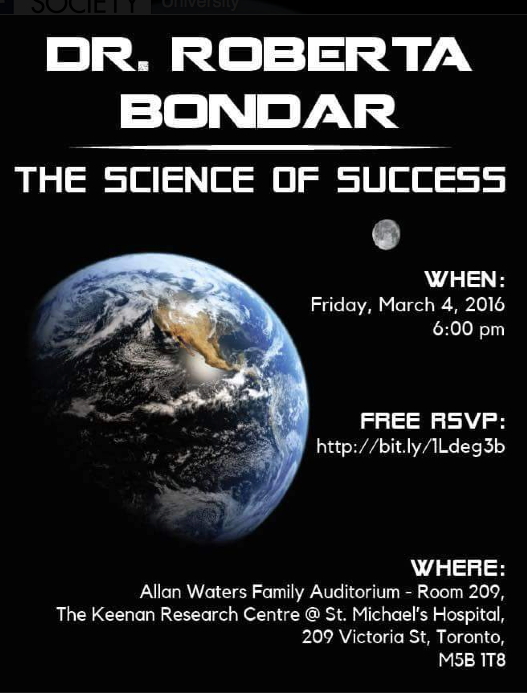
Dr Bondar visited Ryerson University to speak to students in the Faculty of Science about the possibilities of where their Science degree can lead them after graduation — The Science of Success. Aside from her successful academic career, Dr Bondar is the first neurologist in space. From her unique professional path, Dr Bondar shared insights and suggestions about how knowledge from Science degree programs opens up limitless career paths for Science graduates.
Dr Bondar advises “Ask the BIG Questions” — from Ryerson Today
University of Saskatchewan
Scientist, physician, and world’s first neurologist in space, Dr Roberta Bondar speaks about how some physiological issues of long-term space flight would benefit from life studies in manned lunar missions.